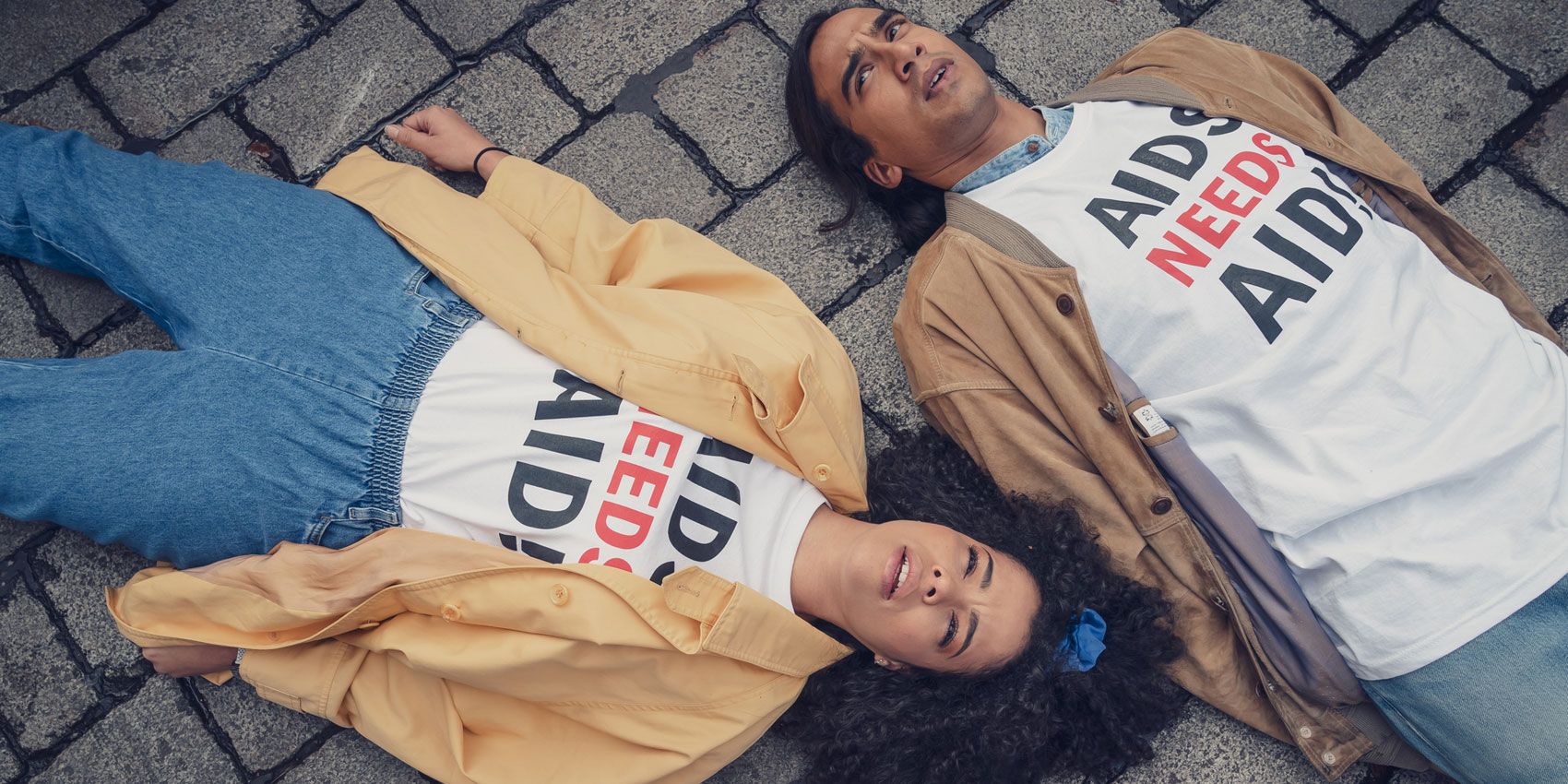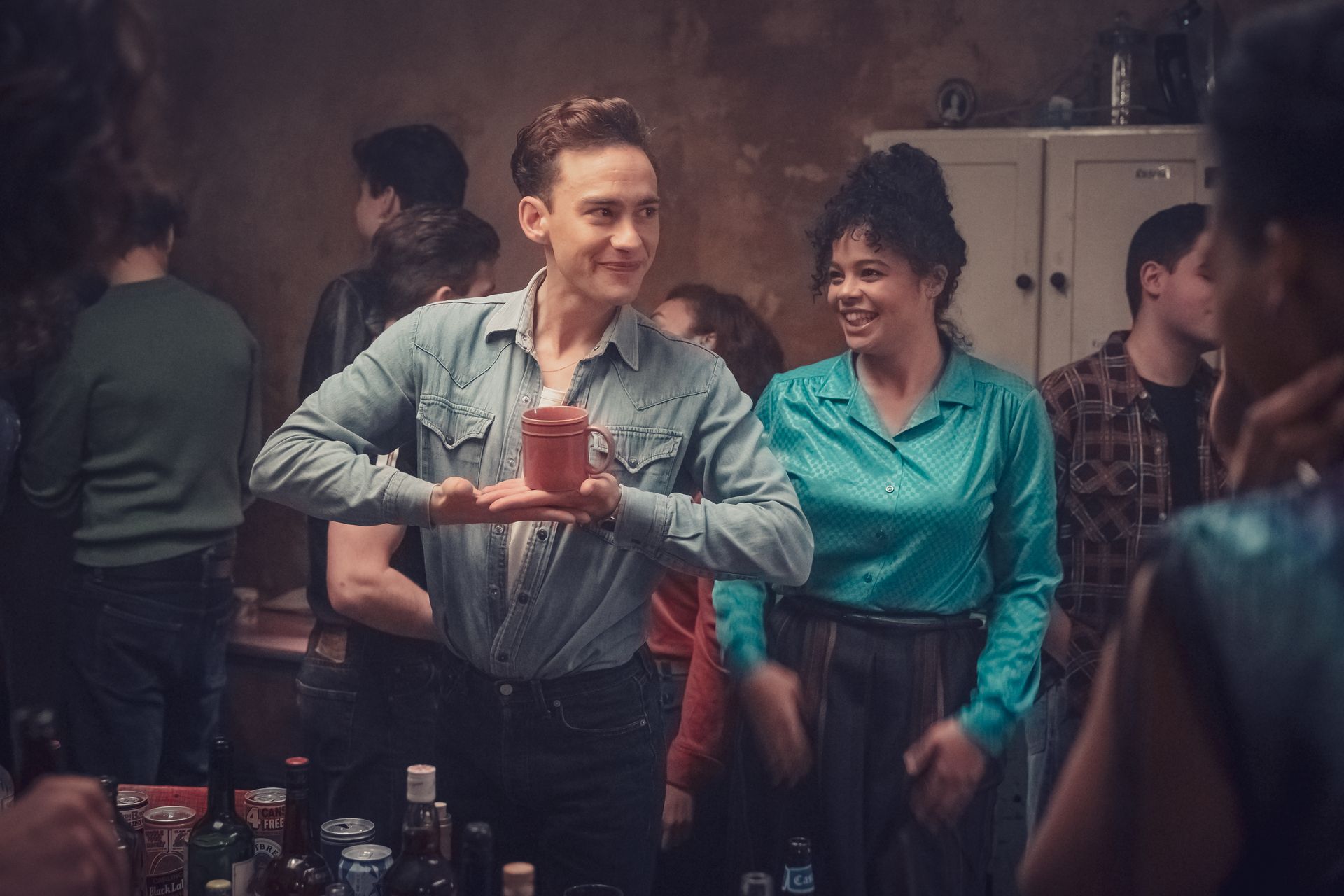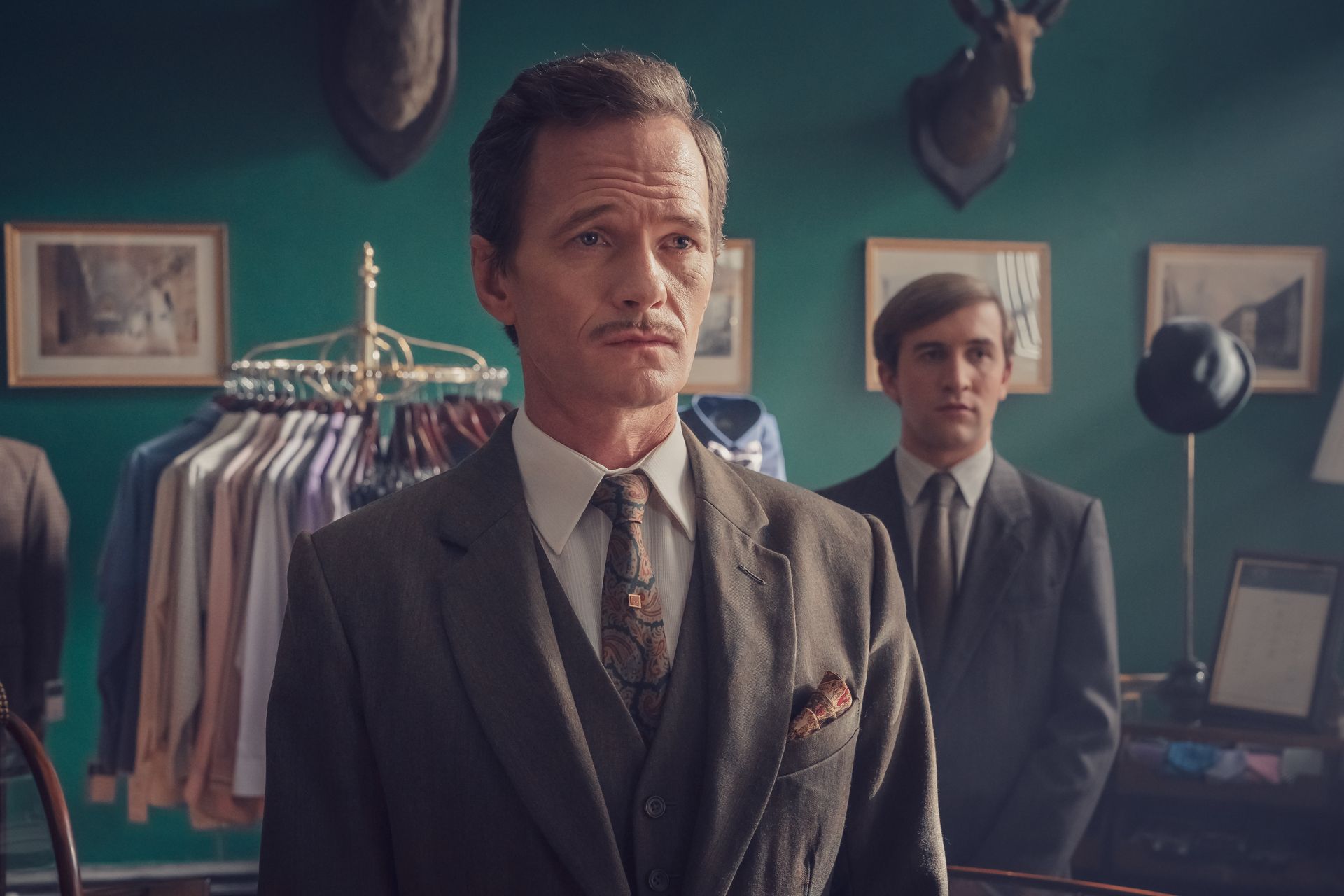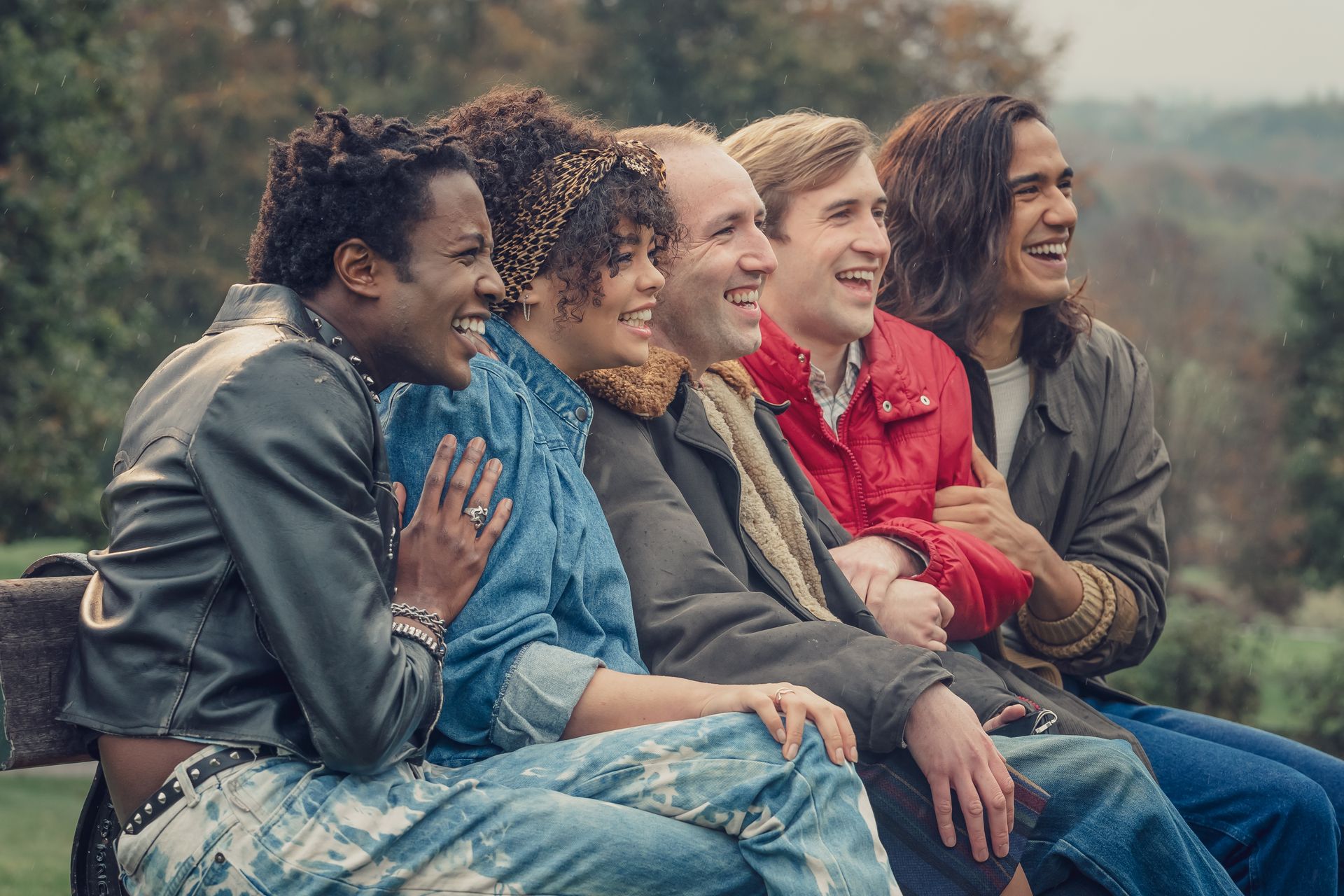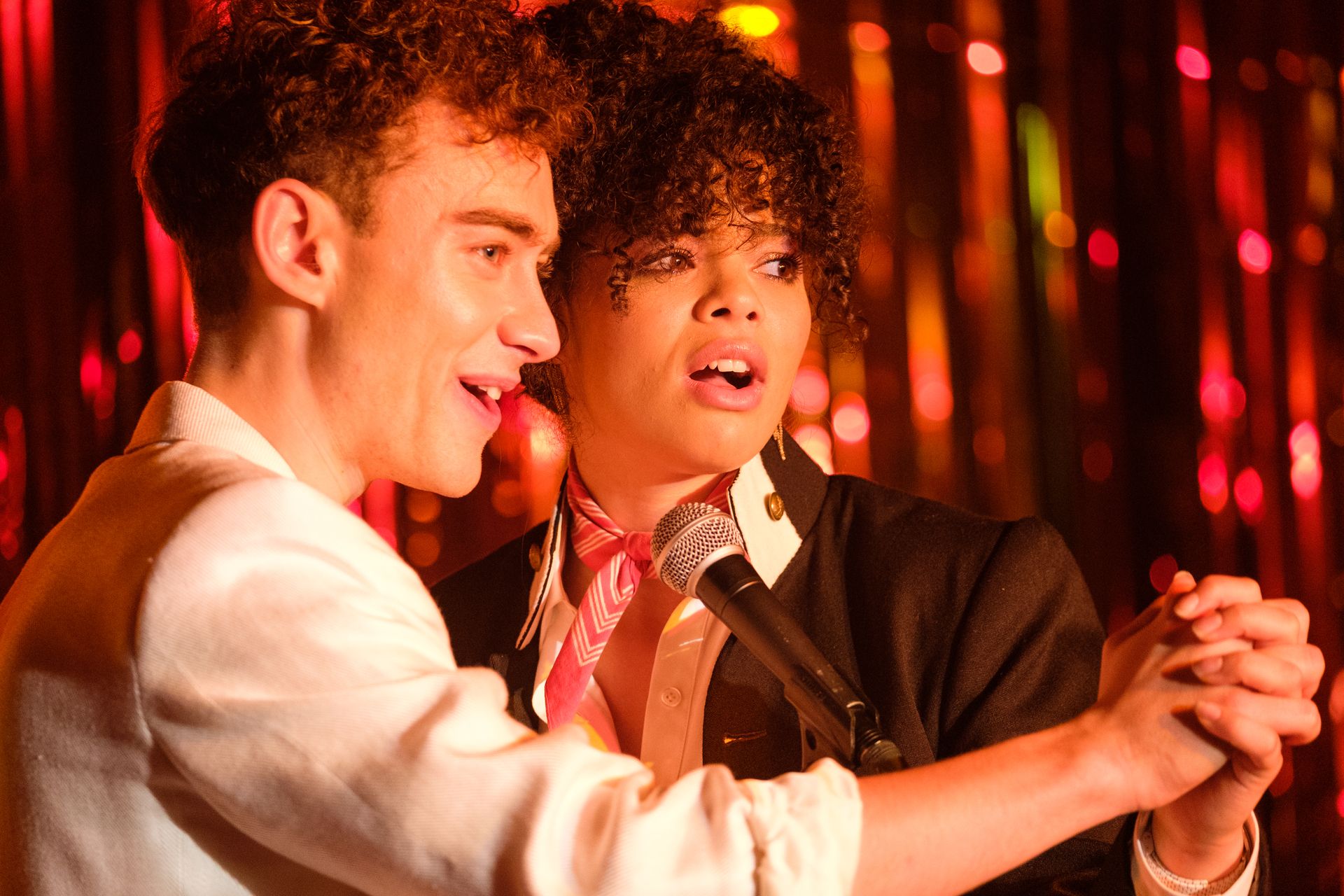The first thing It's a Sin creator Russell T. Davies and I talked about when we hopped on Zoom together was the fact that his new series had a potentially troublesome working title: The Boys. But, fortunately for us entertainment journalists, there will be no confusion between the ultra-graphic Amazon superhero show and Davies' heartbreaking and compelling new drama.
The new name, Davies said, meant making a call to the Pet Shop Boys, but is a very apt title for the series about the AIDS crisis, as seen through the eyes of three young gay men coming of age in 1980s London. Centered around an ensemble including Olly Alexander, Omari Douglas, Callum Scott Howells, Lydia West, and Nathaniel Curtis, with notable guest appearances by Neil Patrick Harris and Stephen Fry, It's a Sin debuted this January in the U.K., and created a massive stir there with its detailed and emotional storytelling.
It's a Sin also electrified British audiences by revealing some truly disturbing facts about what really happened as the threat of AIDS became more and more present. This includes everything from the government literally treating infected patients like criminals to families burning the possessions of their deceased relations.
Below, Davies describes the impact that It's a Sin has had on British audiences so far, the importance of working with an intimacy coordinator for the show's more explicit scenes, and why we're right now seeing more stories tackle this particular period of time. The former Doctor Who showrunner also explains why it was important to make sure the show included an homage to the British sci-fi classic.
One thing I found really interesting about the series, as an American, is how it highlighted how the U.K. government reacted to AIDS, like the fact that there was an act forbidding any mention of homosexuality by local govenments.
RUSSELL T. DAVIES: Yes, I've compressed a lot of this story into a decade of the '80s, just to keep the same cast. But as we know, these events covered 20, 30 years. Some of these events are still ongoing now. So I compressed it into the eighties. So, at more or less the beginning of the AIDS crisis, the conservative government here introduced a law forbidding any mention of homosexuality whatsoever in schools. Which automatically meant that safe sex education could not to be mentioned in schools, which was deadly. That astonishing piece of legislation... It stayed in the legislation until about 2003.
Oh my god.
DAVIES: I know. It's shocking, isn't it? What bastards. I haven't seen that through American eyes actually. I'm just realizing you're the first person who's actually brought that up, because yes, although it's gone now and other people in Britain remember it and still talk about it. Although actually, I live in a bit of a gay world. There's a lot of straight viewers here who are shocked by what they're seeing. They haven't quite realized what that meant. People have watched the news and it said something about Section 28, it sounds like someone waved a banner at the barricade in the North of London or something. They don't quite understand that that was a law affecting every single school. Amazing.
I mean, the thing I've been fascinated by lately is just the idea that we can go through life perceiving that everyone knows as much about a certain subject as we do. For example, we have this new documentary in the U.S. about Britney Spears, and people who have been following Britany Spears' story for years have been like, oh, this just covers the basics. But people who haven't been following her story obsessively are horrified.
DAVIES: Yes, I feel the same with this now, and I hadn't expected this and you know, I'm quite television-literate. I can predict most responses to something. And what I hadn't realized is that I live in a very gay world and the media is a very gay-friendly world. If you go to a charity event, it'll probably be an HIV event. And my magazines and my plays... I'll go and see Angels in America. My culture is full of this stuff, and you forget what a bubble you're in. Actually, the reaction to this from a straight audience has been phenomenal. Children and young viewers, especially, are absolutely shocked at what they're seeing, which I hadn't predicted.
If you'd asked me at Christmas, when I was planning the launch of this in January — you're excited about launching a new show, but you're also dreading it at the same time in case it dies a death. I was literally going to bed thinking, God, I think I pulled my punches on the show. I don't think it's strong enough. I think I've held back a bit. I know, because I did try to keep the temperature under control, keep the anger under control, because I wanted it to be not fueled by anger, I wanted it to be a more accessible and more open show, to find different things to say other than anger. I was really thinking, Gosh, I haven't quite landed this because it's not quite shocking enough.
And much to my surprise, we get reactions of shock and anger. And I'm kind of glad that I didn't go any further because it might've started to get didactic. The outrage is powerful. Honestly, I've been stopped by people in the street every single day, and I'm the writer, people are not supposed to know what I look like, but literally, I mean, five or six times a day. The story I keep getting told is "my children are shocked." And I am with an older generation saying I've never forgotten what it was like or I never knew what it was like — I think if Section 28 didn't affect you, you never noticed it. I don't know what rules are going on in comprehensive schools now. I don't know what's happening because I haven't got any children. So I don't really follow that stuff. But if you don't follow it, you don't know.
When people are coming up to you with that anger, how do you feel like they should channel it? Like what are the productive ways to use that?
DAVIES: Well, unfortunately at the moment I want to hug them, and we're not allowed. I feel very genuinely, people are being so nice about it on the street to me. In normal situations, I really would hug them. And now we're just keeping a distance with masks. I mean, I just hope they keep talking to their kids. Obviously I hope they give a bit of money, too. I mean, it's astonishing things that have happened, like, one t-shirt was launched with the word "La" on it. One man launched the t-shirt with that catchphrase on it and he's made 120,000 pounds for charity already, in just two weeks. One t-shirt. There are millions of t-shirts, thousands of t-shirt designs out there now.
So people are getting active. They're turning to activism. Last week here was National HIV Testing Week, and testing figures went up fourfold. Fourfold! NHS England ran out of home testing kits for the first time in history. So it's having an extraordinary effect. I'm on television every other day. I was on BBC One this morning talking about HIV testing, which is an honor. It's an honor to do, but I remember there's people who've been working in HIV for 40 years, but don't get to be on television. So I try to do my bit, but it's extraordinary really. I've launched some big shows in my time — Queer as Folk, Doctor Who. They were massive. I never expected this to be so massive, but it's quite humbling. If HIV testing rates increase fourfold, that's a really great thing. It's so unexpected. I never saw any of this coming. It's nice though.
Yeah. Speaking of things I maybe saw coming, as soon as there was an actor in the mix, an actor working in the '80s, I wrote down in my notes, "is he going to do a Doctor Who scene?" And then of course it happens.
DAVIES: I happened to know the right people to ask for copyright. I'm sure I got through a few channels that might have been blocked otherwise just from my name. And they got paid. They're always happy to be paid.
Of course. Aside from just the personal joy of getting to get some Daleks into the mix, what was important for you about having that touch there
DAVIES: Well, all the stories in this are based on a hundred different people I knew or people I'd heard of, and anecdotes I've heard, and stuff I've researched. And I did know one actor who was in Doctor Who with the Daleks and he did die of AIDS. So it's a nice little nod to him, but actually, it's also at the same time, I have a lot of fun in this show because I invent a West End musical, an ITV daytime soap opera, there's a bit of Doctor Who, there's auditions for Shakespearean plays, for which I've made up the verse. Shakespeare's out of copyright. We could have just used Shakespeare, but I had such fun sitting here writing iambic pentameter. I told the production team, I said, "It's called Webster's the Maiden's Guise." Completely made-up play. I just waited to see who'd look it up. I got to write iambic pentameter. I loved writing that.
So, because there were two characters who were actors. It allowed me to have a lot of fun with that, for two reasons. Partly because the West End, as in Broadway, was one of the first areas to kind of weaponize itself against HIV. They were the first people to start fundraising. They were the coolest boys who disappeared. They were the first to fall ill. So the West End did a brilliant job in fundraising, and still does to this day. But also it's my job to bring an audience to a very tricky subject. We imagined before transmission this would turn people off, because it's such a serious subject matter. So I kind of had to tap dance my way through it and make it as genuinely entertaining as possible, musicals and Doctor Who and soap operas, just to create good pictures on screen that would draw an audience in. So it was very deliberate, to make it an entertaining drama.
Of course. There are a few sequences where you kind of get at the power of stuff — the power of stuff that people accumulate in their lives and then gets left behind when they're gone, including a scene where one person's belongings get burned. What for you was important about that?
DAVIES: Well, that's exactly it. That's exactly the stuff I had to sit and measure, as to how much horror to go into. It was a very tricky balance. I was always very clear — I didn't want to fetishize the deaths, particularly. We don't actually linger on people who were very ill and you don't actually see any proper death sequences. You don't actually see anyone die, because I had theories about that. The screen can do strange things to things like that, scenes that can almost seem glamorous. The illnesses, we don't dwell on them too much. It's a nasty virus. It's cruel. And we see details of it, but I didn't want to dwell on it. But balancing that is that I have to kind of let rip and show the power and the horror of what people really did.
I talk about showing the joy of these people's lives, but you have to balance that with the awful things that happened, when people literally burned the possessions of their children. These are all true stories and not just true stories once, true stories many times over, that happened. People were either so frightened or so ignorant that they had to burn everything their child had touched, whether they were burning their child out of existence is up to them when they finally meet their maker.
I hope it's not too didactic. Many years have passed, I hope in those moments, there's some forgiveness for those families. I hope your horror is kind of a realization that they've gone too far. And I have to wonder what those families think these days. I've spoken to a lot of those families. Unbelievably, a lot of that anger still persists. Unbelievably, a lot of them are still in denial. But I also talked to families where, of course, they moved on and of course, they've come to appreciate the life that they lost and talk about their sons with joy. And don't particularly dwell on what they did. If they did something terrible in grief, I think we're all allowed to do that. And some people have learned from that.
So yeah, it is upsetting, isn't it? It's very powerful stuff to talk about. It's very powerful to dramatize it. There's a great crew that really treated this with the seriousness that it deserves and shot all that stuff brilliantly, I think.
It was. Was this your first time working with an intimacy coordinator?
DAVIES: It was. Yes, yes, yes, yes, yes, which meant I wasn't even there, because you couldn't be there. I talked to the cast, handed it over to the intimacy coordinator, and left that to the director as well because that's a great process. Absolutely great process. It's now unimaginable to do things any other way. Wonderful process. Everyone felt safe and happy.
Excellent. So at least in the U.S., one of the first major mainstream films to talk about homosexuality that didn't mention AIDS was in 1997 with In & Out — we couldn't talk about homosexuality without talking about AIDS up until that point. And now, of course, there are a fair number of new stories that really focus on this incredibly important issue. Do you feel like it's going back and forth, almost like a pendulum?
DAVIES: It is. It's also one of those situations where you can't do right for doing wrong. Because in the '90s, if you created gay characters without mentioning HIV, you got in trouble. And that's with the gay audience as well, because everyone is literally split down the middle — always, when it comes to this subject matter, still to this day. When [It's a Sin] was announced, there were gay people rolling their eyes saying, do we have to have another HIV drama? And equally there were people saying, yes, we need this HIV drama. Those arguments are absolutely fine. The only important thing is that writers ignore them. Ignore those items and just go write whatever you want. But, so Queer as Folk was a very big step. The British Queer as Folk didn't mention HIV at all.
Interestingly, one of the very first gay dramas, if not the first gay drama, was An Early Frost, starring Aiden Quinn, written by Ron Cowen and Dan Lipman, who did the American Queer as Folk. So weirdly, we've kind of all ended up... I spoke to them the other day and they were kind of enchanted that this has happened in our lives. An Early Frost is a brilliant piece of work. It's been slightly forgotten, I think. I think one of them was saying, it's not available anywhere. You can't stream it anywhere. It's a great piece of work. It's a really, really clever piece of work. Oh, there's brilliant moments in that, and the ending is astonishingly heartfelt.
So, it is funny — when I was pitching this story, like I said, trying to get it made, there were commissioners kind of rolling their eyes because they felt they'd seen it before. It was very hard to sit there with them and say, you haven't actually seen this. You think you have, because you've seen American things and you've seen soap opera versions of this, but you haven't actually seen the story told properly. So it's a tricky one. It will always...
But then I think every generation... I think I'm absolutely certain, in 20 years, you'll be sitting here doing another Zoom, or a 3D Laser Zoom, with the next queer artist who's come along to tell queer stories, and turn their lens onto the AIDS crisis. The stories keep being told, because it's the government and the people. It's life and death. It's a great story and informs the world to this day, really. So I think it'll always be a great story.
Last year, I went and saw The Inheritance. I saw that in the West End — that's an amazing play that's entirely about HIV by a writer called Matthew Lopez, looking back. Fantastic piece, about seven hours long. That's long, but it's worth it. It's really good.
To really quickly wrap up, what's next? What am I talking to you about in 2022?
DAVIES: I'm kind of slightly in the back seat. I've been mentoring a lot of people. We have a writer called Lenny Henry over here. He's very famous. Sir Lenny Henry, he's very famous over here. And he phoned me up in the middle of the lockdown and said, "Will you mentor me? Will you come and edit my scripts?" He's a great man, so I said I'd be delighted and that script's been commissioned. So I'm like the script editor on that and at the same time, someone else I've been mentoring has had their drama commissioned by ITV. It's not been announced yet, but it's on its way. And so that's nice. I feel like I'm entering my grandfather phase, to be honest. I'm very proud of my children, my grandchildren. So it's not a back seat. I don't have to say I'm in the back seat, because I worked very hard on those shows. But I'm not quite at the front seat of these things, which is quite nice for a while, I think.
It's a Sin is streaming now on HBO Max.

